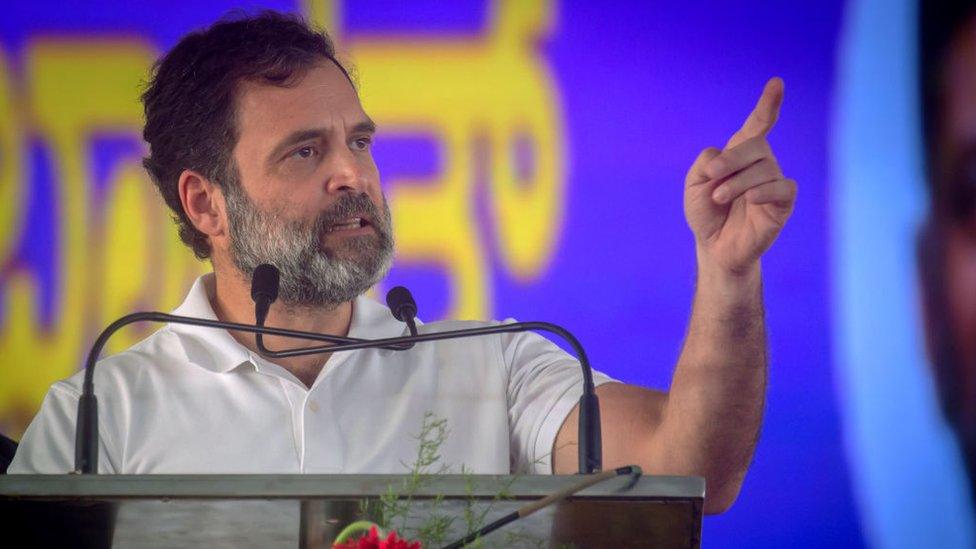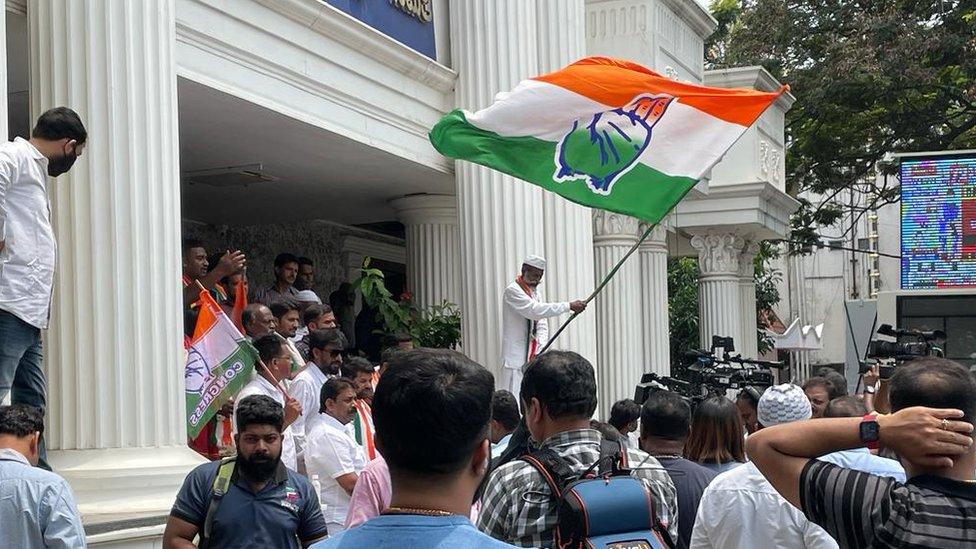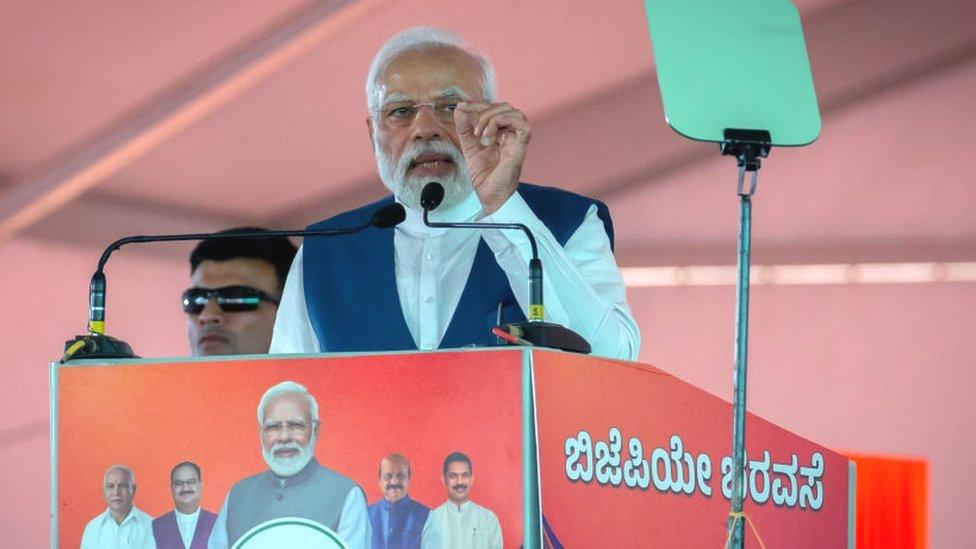Karnataka results: Congress wins key India state election
- Published

In March, Congress leader Rahul Gandhi was disqualified as a lawmaker
India's main opposition Congress party has defeated Prime Minister's Narendra Modi's governing Bharatiya Janata Party (BJP) in a crucial election in the southern state of Karnataka.
Experts say the win will give the Congress party a much-needed morale boost ahead of the national election due next year. Karnataka - the BJP's only bastion in southern India and home to tech hub Bangalore - was the first of five big states to go to the polls this year.
According to the Election Commission's website, the Congress has won more than 130 out of 224 state assembly seats - it needed a simple majority of 113 seats to form the government on its own. The BJP is ahead in less than 70 seats.
Dozens of Congress supporters gathered outside the party headquarters in Bangalore and New Delhi, waving party flags and shouting victory slogans.
"The market of hate has been shut, and shops of love have opened," Congress leader Rahul Gandhi told supporters in Delhi.
Earlier in the day, the BJP's incumbent state chief minister Basavaraj Bommai conceded defeat, saying that "in spite of the efforts of the prime minister and party workers, we could not make the mark".
Mr Modi had run a gruelling campaign to help the BJP retain power in the state, addressing several rallies and roadshows within a span of 10 days. The Congress's efforts were led by national leaders including Mr Gandhi and party president Mallikarjun Kharge, along with state leaders Siddaramaiah and DK Shivakumar (both of whom are in the running to become chief minister).

Congress supporters outside the party's headquarters in Bangalore
Congress spokesperson Akhilesh Pratap Singh told the BBC that the results from Karnataka would have a larger impact ahead of next year's general election.
"The BJP will lose the assembly elections later this year in Madhya Pradesh, Rajasthan, Telangana and Chhattisgarh. Mr Modi would lose next year's general election too," he claimed.
But Suvrokamal Dutta, a political analyst who supports the BJP, disagreed, saying that one election victory would not improve the Congress's fortunes.
"Narendra Modi is too big a challenge for the Congress party to handle," he said.
The Congress was once India's most powerful party, governing India almost continuously - except for a few years - from independence in 1947 to 2014, when Mr Modi's BJP swept to power by a landslide. Since then, the party has been striving to regain its lost political prominence.
The results in Karnataka are also significant for the Congress as it comes less than two months after Mr Gandhi, its former president, was convicted for defamation and disqualified as a lawmaker.
Analysts say that the BJP, which had been governing Karnataka for four years, faced strong anti-incumbency sentiment. Its tenure was marked by internal squabbles and allegations of poor governance. Party leaders also mostly focused on the achievements of Mr Modi's federal government in their speeches.
The results show that the Congress was "able to put its differences aside" and come together to fight the election, says political analyst Vijay Grover.
"Mr Modi had staked his own personal charisma and credibility to try and revive the party from anti-incumbency. But that doesn't seem to have happened at the level that he would have expected," he says, adding, however, that the prime minister's popularity was still a significant factor nationally.

Prime Minister Narendra Modi had led a gruelling campaign for his party in Karnataka
The Congress party highlighted issues such as inflation, high unemployment and the BJP's alleged poor governance, which seem to have struck a chord with voters.
Some Bangalore residents told the BBC that the Congress ran an energetic, well-planned campaign and managed to counter the BJP's criticisms effectively. Mr Shivakumar and Mr Siddaramaiah also worked well together to capitalise on the anti-incumbency sentiment, they added.
The election campaigns were intense, with both parties promising several measures to help the poor, including free gas cylinders and electricity.
The Congress's promise to ban the Bajrang Dal, a hardline Hindu group, had sparked a controversy ahead of the election. The Congress equated Bajrang Dal with the Popular Front of India (PFI), a controversial Muslim group which was outlawed last year.
The BJP, in turn, accused the Congress of being "anti-Hindu", saying the party had hurt the sentiments of the followers of the monkey god Hanuman, also known as Bajrang Bali.
Mr Singh from the Congress claimed that Karnataka's voters had rejected the "divisive and communal politics" of the BJP. He also said that Mr Gandhi's nationwide "unity march", which ended in January, galvanised Congress members.
Mr Dutta, however, said that the Congress party should not get carried away by its victory, pointing to the party's earlier losses in several states in north and north-eastern India.
Political analyst and author Sugata Srinivasaraju added that the results in Karnataka don't necessarily indicate an advantage to the Congress in the general elections.
"The context and narratives will be very different in 2024. It happened last time too. The BJP in Karnataka may benefit in 2024 because it would have shed its anti-incumbency by then," he said.
With inputs from Imran Qureshi, BBC Hindi
BBC News India is now on YouTube. Click here, external to subscribe and watch our documentaries, explainers and features.

Read more India stories from the BBC:
